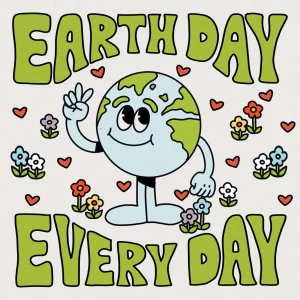Winter is Heating up this Year
January 27, 2022
This December has been the hottest in a 30-year period for New Jersey. With record breaking temperatures, climate change and global warming issues are becoming more prevalent.
With varying temperatures this month, Dr. Sentman, who works at NOAA (National Oceanic and Atmospheric Administration) talked about the highs and lows of this December in Trenton, “Based on data from the National Weather Service Mount Holly/Philadelphia Weather Forecast Office, the December 2021 average temperature in Trenton was 41 ̊F; 3.9 ̊F warmer than climatological normal average temperatures (36.8 ̊F).”
Having a 3.9 degree increase in average temperature doesn’t seem that big, but when compared to the high and lows, there is an impact. Dr. Sentman said, “The maximum temperature for the month reached 66 ̊F and the minimum dipped to 21 ̊F. This variability is larger compared to the 30-year climatological normal maximum of 44.4 ̊F and minimum of 29.3 ̊F for the period 1991-2020 in Trenton.” Now what has been the maximum for the past 29 years is slowly becoming the average shows an increase in temperature.
The reason for the increase in temperature is due to climate change and global warming. Dr. Sentman described the differences between the two, “Global warming refers to the observed increase in global mean surface air temperature, while climate change relates to changes in climate variables including but not limited to temperature (e.g., precipitation, ice thickness, sea level).” Both are related but they aren’t entirely the same.
One of the contributing factors to climate change and global warming is humans. Meteorology teacher Mr. Ballos goes over how humans contribute, “There are many ways humans contribute to climate change. Plain and simple one way is what our diet consists of. The food we purchase travels many miles to our supermarkets which has a carbon footprint especially if we eat meat, chicken, pork, etc.” Transportation is one of the main contributors to global warming.
Mr. Ballos said, “Burning of fossil fuels to run vehicles, operate buildings, keep houses warm, etc also contribute. Furthermore, an increase in population has greater a greater demand of resources which in turn has had a detrimental impact on our planet (Clear cutting forests, etc).” There is a lot that contributes to climate change that deals with the way humans live and function.
There are many ways to minimize the impact humans have on the environment, Mr. Ballos said, “Try to be more environmentally friendly by reusing items, recycle, not pollute, reduce water footprint, but local, carpool (if possible), walk, bike to places, make your own garden, plant trees, and let your homes warm up naturally (sunlight).”
Although even with minimizing our input, there isn’t a way to reverse the impact we have caused. If the trend continues where temperatures increase, Dr. Sentman says, “As each year passes, we see more and more unprecedented, extreme weather events that are completely devastating. There is no doubt global warming will continue in the next 10 years – even if we stop all emissions right now. The problem is the long-timescale warming that is part of the climate system.” Even though it doesn’t seem like enough, every step towards stopping global warming counts and can make the difference in the long run.
With technology and science advancing as years go on, there may be a solution to stop all emissions, until then it’s good to know the impact humans have and ways to prevent it.




















